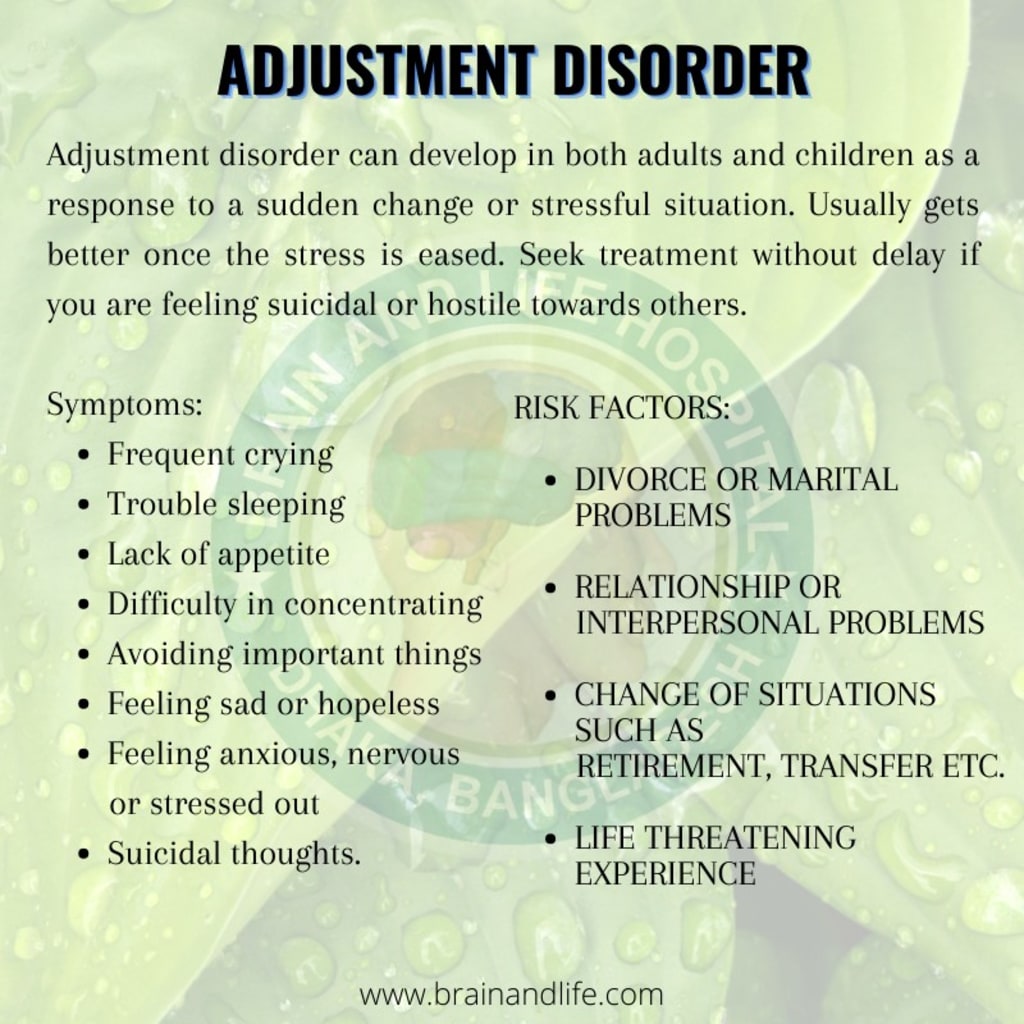Treatment of Adjustment Disorder: Understanding and Managing the Condition
Treatment of Adjustment Disorder: Understanding and Managing the Condition

Adjustment disorder is a common mental health condition that occurs when a person has difficulty adjusting to a stressful life event or change, such as a job loss, divorce, or illness. People with adjustment disorder may experience a range of emotional and behavioral symptoms that can significantly impact their daily life and well-being. However, with the right treatment, most people with adjustment disorder can recover and return to their normal functioning.
In this article, we will discuss the symptoms of adjustment disorder, the different types of treatment available, and how to manage the condition effectively.
Symptoms of Adjustment Disorder
Adjustment disorder can cause a variety of emotional and behavioral symptoms, which can differ depending on the individual and the nature of the stressor. Some common symptoms of adjustment disorder include:
Emotional Symptoms: Individuals with adjustment disorder may experience a range of emotions, including:
- Sadness
- Anxiety
- Worry
- Hopelessness
- Anger
- Frustration
- Irritability
Behavioral Symptoms: Individuals with adjustment disorder may also experience changes in their behavior, such as:
- Withdrawal from social activities
- Avoidance of certain situations or people
- Changes in sleep patterns
- Increased use of alcohol or drugs
- Reckless behavior
Physical Symptoms: In some cases, adjustment disorder can also cause physical symptoms such as:
- Headaches
- Stomachaches
- Fatigue
- Muscle tension
Types of Adjustment Disorder
There are six different types of adjustment disorder, each with its own set of symptoms and characteristics. These include:
Adjustment Disorder with Depressed Mood: Individuals with this type of adjustment disorder experience symptoms of depression, such as sadness, hopelessness, and loss of interest in activities they once enjoyed.
Adjustment Disorder with Anxiety: Individuals with this type of adjustment disorder experience symptoms of anxiety, such as excessive worry, restlessness, and tension.
Adjustment Disorder with Mixed Anxiety and Depressed Mood: Individuals with this type of adjustment disorder experience a combination of symptoms of anxiety and depression.
Adjustment Disorder with Disturbance of Conduct: Individuals with this type of adjustment disorder exhibit behavioral symptoms, such as acting out or engaging in reckless behavior.
Adjustment Disorder with Mixed Disturbance of Emotions and Conduct: Individuals with this type of adjustment disorder exhibit a combination of emotional and behavioral symptoms.
Adjustment Disorder Unspecified: This type of adjustment disorder is used when a person’s symptoms do not fit into one of the other types.
Treatment of Adjustment Disorder
The primary goal of treatment for adjustment disorder is to help individuals manage their symptoms and develop coping strategies to deal with the stressor that triggered their symptoms. There are several different types of treatment available for adjustment disorder, including:
Psychotherapy: Psychotherapy, also known as talk therapy, is a type of treatment that involves talking with a mental health professional to explore and understand the underlying causes of a person’s symptoms. Psychotherapy can help individuals develop coping skills and strategies to manage their symptoms and improve their overall quality of life. There are several types of psychotherapy that may be used to treat adjustment disorder, including cognitive-behavioral therapy (CBT) and interpersonal therapy (IPT).
Medication: In some cases, medication may be used to treat the symptoms of adjustment disorder, particularly if the individual is experiencing severe anxiety or depression. Antidepressants, anti-anxiety medications, and sleep aids may be prescribed to help alleviate symptoms.
Supportive Care: Supportive care involves providing a supportive environment and resources to help individuals manage their symptoms and adjust to the stressor. This may include providing counseling, financial assistance, or other resources to help the individual cope.
Group Therapy: Group therapy involves meeting with a group of people who are experiencing similar symptoms and issues. Group therapy can provide a supportive environment and help individuals develop coping skills and strategies to manage their symptoms.
Family Therapy: Family therapy involves meeting with a mental health professional with family members to explore and understand the underlying causes of the individual's symptoms. Family therapy can help improve communication and relationships, and develop coping strategies to manage the stressor.
Effective management of adjustment disorder requires a combination of different treatment methods. The choice of treatment depends on the severity of symptoms, the individual's preferences, and the availability of resources.
Managing Adjustment Disorder
In addition to receiving professional treatment, there are several self-care strategies that individuals with adjustment disorder can use to manage their symptoms. These include:
Exercise: Exercise is an effective way to reduce stress and improve overall well-being. Regular exercise can help alleviate symptoms of depression and anxiety, and promote better sleep.
Meditation: Meditation involves focusing on the present moment and reducing stress and anxiety. Meditation can help individuals manage their symptoms and develop a sense of calm.
Self-Compassion: It is important to practice self-compassion, be kind to oneself, and not to judge oneself harshly. One can try to speak to oneself in a gentle and kind manner and treat oneself with respect.
Seeking Social Support: It is important to seek out social support from family, friends, or support groups. Having a support system can help individuals manage their symptoms and cope with the stressor.
Avoiding Substance Abuse: Substance abuse can exacerbate symptoms of adjustment disorder and cause other health problems. It is important to avoid using alcohol and drugs to cope with stress and seek help if needed.





Comments
There are no comments for this story
Be the first to respond and start the conversation.